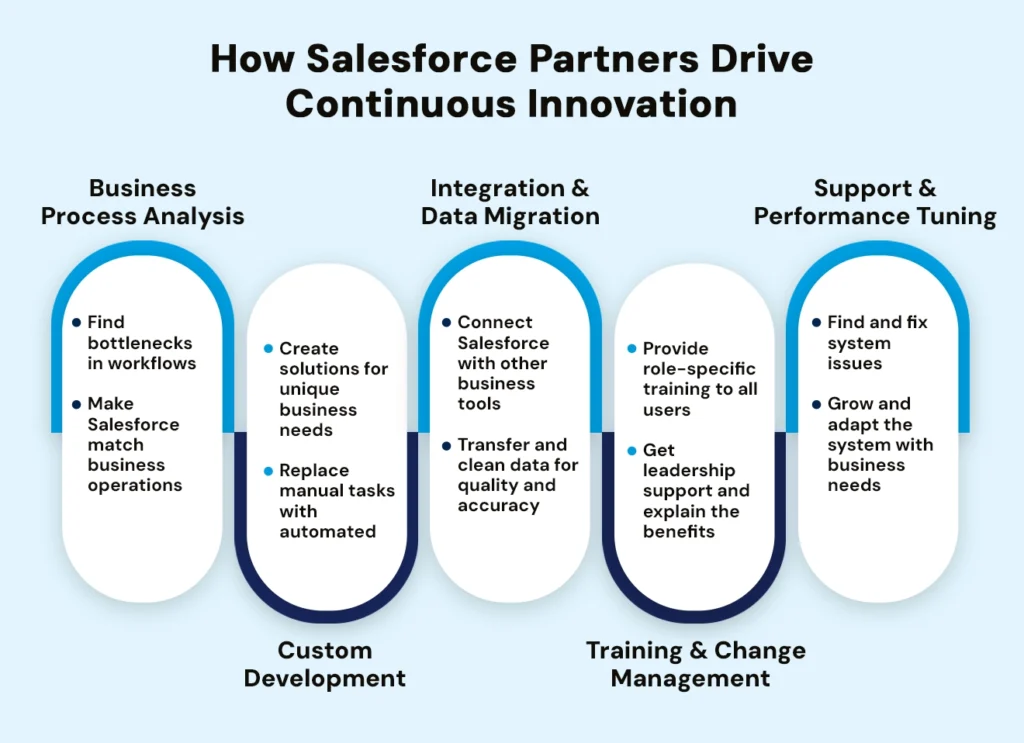Does simply implementing Salesforce guarantee business success? A good start is important, but it is only the first step.
Many organizations discover that their actual CRM journey starts long after the initial setup. Keeping pace with the platform’s continuous updates often stretches internal teams beyond their limits. This gap makes an experienced consulting partner essential.
Salesforce partners do a lot more than provide technical support. They streamline project management and automate complex workflows. These experts connect systems that would otherwise work in isolation. They also maintain data quality by cleansing and optimizing information. Put another way, consultants reshape Salesforce from a static tool into a growing force for businesses.

This blog explains how Salesforce consulting goes beyond implementation to encourage ongoing innovation and business transformation. Let’s get started.
Table of Content
- The Changing Role of Salesforce Consultants: Why Traditional Support is No Longer Sufficient?
- What Challenges Do Enterprises Face After Salesforce Implementation?
- What Services Enable Salesforce Consulting Partners to Drive Continuous Innovation?
- How Do Salesforce Consultants Create Long-Term Value
- In What Ways Does a Salesforce Consulting Partner Help Organizations Achieve Desired Outcomes?
- The Final Word
The Changing Role of Salesforce Consultants: Why Traditional Support is No Longer Sufficient?
The role of a Salesforce consulting partner was once narrowly defined by implementation and simple troubleshooting. But this traditional model does not cut it anymore. Businesses now face challenges that demand much more sophisticated expertise. Today, Salesforce consultants have transformed from technical assistants into business partners who drive innovation. They use their deep technical knowledge and strategic business thinking to solve complex problems.
This change makes sense when you realize what is at stake. Most companies cannot maximize their return on investment without expert assistance. Consulting partners align the platform’s capabilities with their business goals, and this ensures Salesforce fuels actual growth instead of just storing data.
Today, consultants handle multiple responsibilities throughout the customer lifecycle. They dig deep into their customers’ current challenges and future needs. They create detailed business cases, manage complex projects, implement tailored solutions, and track progress against pre-decided goals. This approach goes far beyond the older support models of just keeping the platform running.
The platform itself has become incredibly complex. Salesforce rolls out new features on a regular basis, and most companies find it difficult to keep up. They fail to tap into the full potential of Salesforce without specialized guidance. Consultants close this gap by staying updated with platform changes and using them to propel growth.
What Challenges Do Enterprises Face After Salesforce Implementation?
Successful implementation is just the beginning of an organization’s Salesforce journey. Organizations face the most important operational challenges only after the initial launch. They experience difficulties with basic Salesforce administration and maintenance tasks. Many of them fail to implement new Salesforce functionality effectively. These issues can diminish their return on investment.
Data quality becomes a big concern after implementation, when companies discover that their data is messier than expected. This creates critical problems like data silos, duplicate records, and incomplete information. Without proper management, these issues cascade into inaccurate reporting and poor business strategies.
User adoption is another hurdle. Employees might perceive Salesforce as additional work rather than a helpful tool. This resistance usually comes from poor training, complex interfaces, or workflows that do not match how people actually work. Sometimes, staff members revert to older platforms like spreadsheets instead of embracing Salesforce fully.
Technical complexity grows over time. Many companies make the mistake of customizing their Salesforce instances too much. This turns Salesforce into a complex system that few can understand and use. It creates technical debt, where teams are left with temporary fixes and shortcuts that no one has documented.
Salesforce needs to connect smoothly with other systems to deliver value. Without these integrations, organizations face significant operational issues. Disconnected systems create silos and force people to enter the same information in multiple places. This results in fragmented customer profiles and a protracted sales cycle.
Siloed communication makes these challenges worse. A feature requested by one department may disrupt another’s critical workflow. Such uncoordinated changes may lead to system-wide problems and erode trust in the platform.
Salesforce consulting partners offer specialized expertise that helps organizations overcome these impediments. These partners set up data quality frameworks and create adoption strategies. They also provide the knowledge needed to maintain and optimize complex Salesforce environments well beyond initial implementation.
Ready to transform your CRM strategy? Our Salesforce consulting team is here to help.
What Services Enable Salesforce Consulting Partners to Drive Continuous Innovation?
Did you know? The global market for Salesforce consulting services is estimated to grow from $20 billion in 2025 to $57 billion in 2032.
– Fortune Business Insights
A Salesforce consulting company delivers many services. These offerings form the foundation of innovation and help organizations derive maximum value from their investments.
1. Business Process Analysis
Salesforce consultants examine existing workflows to find inefficiencies and areas that need improvement. This analysis helps them create a blueprint for configuring Salesforce to match an organization’s needs.
Their goal is to tailor Salesforce for business operations. They improve system configurations so that everyone can use it easily and get better results. They also run regular process audits to spot bottlenecks in workflows. These partners also use Salesforce reports and dashboards to understand what’s working well and what is not.
2. Custom Development and Automation
Custom development becomes necessary when standard Salesforce features fall short. Salesforce consulting partners create tailored solutions that help address specific business problems. These solutions offer greater flexibility and control than off-the-shelf ones.
These experts also build custom fields, objects, and workflows to boost productivity. They implement automation to eliminate manual tasks and streamline processes. This helps operations run smoothly.
3. System Integration and Data Migration
Connecting Salesforce properly with other business systems is essential for maximizing its value. Consulting partners create integrations that help data flow smoothly across different systems.
Consultants use APIs to connect Salesforce with ERP, marketing tools, and support software. This eliminates silos and supports the seamless flow of information. They also optimize these connections for speed. This reduces lag and runs operations without interruption.
Data migration is a big challenge for organizations that shift to Salesforce. Consulting partners hold expertise in this process. They use advanced tools to clean and prepare data for a smooth transfer. They also employ deduplication tools to find and merge duplicate records. This maintains high data quality from the very beginning.
4. User Training and Change Management
A powerful Salesforce system fails without user adoption. Salesforce consulting partners help teams use the platform effectively through targeted training and change management.
User training starts with understanding the audience and their needs. Consultants assess technical skills, identify user groups, and recognize various learning styles. This makes the training relevant for everyone.
These consultants also manage the human side of change. They help teams secure leadership support. They explain the benefits of Salesforce implementation to everyone. They also handle resistance when required. This comprehensive approach ensures successful adoption.
5. Support and Performance Tuning
Salesforce consulting partners provide essential ongoing support after implementation. Their support maintains the platform’s health and drives improvements.
Consultants handle system updates and upgrades to ensure access to new features and security patches. They also run data quality checks to maintain accuracy and compliance with governance policies. Additionally, they conduct regular performance monitoring to spot potential bottlenecks.
Salesforce environments must evolve with business needs. Consulting experts help organizations scale their systems by adding new features, supporting more users, and adapting processes as business complexity grows. Their support ensures organizations get maximum value from their investments.

How Do Salesforce Consultants Create Long-Term Value
Salesforce consulting partners build lasting business value through strategic planning and continuous improvement. They focus on several key areas to secure long-term growth.
I. Aligning CRM with Business Strategy
Salesforce specialists align the CRM with core business goals. They view Salesforce not as a simple database, but as an engine for driving progress toward specific goals. This requires customizing the platform to match an organization’s objectives and customer journey. Every field, workflow, and dashboard should serve a clear purpose. This approach helps businesses achieve better user adoption and a stronger return on investment.
Leading consultants maintain this focus over time. They perform routine CRM audits to check if custom fields, workflows, and dashboards still support the current business direction. This practice keeps the system effective and prevents it from becoming cluttered with unused features.
II. Improving Data Quality and Reporting
Poor data quality costs organizations $15 million each year on average. That’s a steep price for unreliable information.
Salesforce consultants address this challenge. They build strong data governance frameworks to maintain clear accountability and data handling standards. Their process includes several key actions.
These experts set clear metrics and processes to monitor data quality. Regular audits and feedback mechanisms help detect errors and support continuous refinement.
Consultants also create effective data entry processes with consistent formats and validation rules. This helps reduce mistakes at the source. Furthermore, they use automated tools to detect and correct errors.
Companies that apply these methods see better financial results. They avoid substantial losses and make more informed decisions.
III. Enhancing User Adoption and Involvement
The value of a technical platform depends on how well users adopt it. Salesforce consultants boost adoption by creating structured adoption plans and collecting regular feedback.
A critical step involves securing executive support. When leaders actively use and promote Salesforce, employees are more likely to adopt it. The approach builds a culture of accountability where managers set expectations for how teams should use the platform.
Consultants also create incentive programs that encourage employees to use Salesforce actively. Research shows that companies need at least 75% CRM adoption to see meaningful gains in sales performance. Without proper adoption strategies, Salesforce implementations underperform.
Future-proof your CRM with our Salesforce consulting team
In What Ways Does a Salesforce Consulting Partner Help Organizations Achieve Desired Outcomes?
A Salesforce consulting company converts technical capabilities into business gains. Its expertise helps businesses make the most of their Salesforce investment through measurable outcomes.
1. Accelerated Time-to-Value
Salesforce consulting partners reduce implementation times substantially. They use tested methods and best practices to set up new features. Because of this, companies launch customer workflows quickly. They earn returns on their investment and see business benefits much earlier.
2. Industry-Specific Expertise
Salesforce specialists create solutions that address unique challenges in different sectors. In healthcare, they improve patient management. Financial services benefit from stronger compliance tools. Manufacturing firms gain better supply chain coordination. Solutions focused on specific industries help modernize operations, save time, and reduce costs.
3. Continuous Innovation Culture
Reliable consultants build habits of steady improvement. They establish processes that spot opportunities for enhancement as they arise. Future-centered businesses apply this disciplined approach to see better returns and transform Salesforce into a dynamic tool for business development.
The Final Word
Salesforce consulting partners deliver value that’s not limited to the initial setup. They serve as advisors to customers, helping them turn Salesforce from a basic tool into a powerful platform that fuels development. Companies working with qualified consultants gain several benefits. They manage post-implementation challenges more effectively and build advanced solutions.
Growth-focused companies now see Salesforce as an ecosystem that needs constant optimization, not just a one-time setup. Those who embrace this partnership set themselves up for long-term success. They build cultures focused on steady improvements where Salesforce becomes a catalyst for progress.
Remember, the true value of the Salesforce isn’t realized on day one. It is built through careful optimization and innovative thinking that experienced partners bring to the table.

